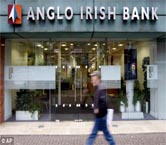Shareholder rage after Anglo Irish Bank nationalized
 Dublin - Anger is rising in Ireland after the latest body blow to the economy with the panic nationalization of the scandal-hit Anglo Irish Bank, the country's third-largest bank.
Dublin - Anger is rising in Ireland after the latest body blow to the economy with the panic nationalization of the scandal-hit Anglo Irish Bank, the country's third-largest bank.
Enraged Anglo Irish shareholders are demanding the resignation of the bank's directors and threatened legal action after it emerged that undisclosed loans to the bank's former chairman Sean Fitzpatrick totalled 129 million euros (171.5 dollars).
Shares in Anglo Irish Bank were suspended Friday on both the Dublin and the London stock exchanges after the government announced the takeover late Thursday.
Both Finance Minister Brian Lenihan and Anglo Chairman Donal O'Connor said fair compensation for shareholders would be sought, but shareholders remained unconvinced.
It is considered likely that, as was the case with recent nationalizations in Britain, shareholders will get no more than a tiny fraction of the 17.31 euros at which the bank once traded.
Currently, the shares stand at a meagre 22 cents.
County Cork pensioner John O'Leary, who invested in Anglo Irish five years ago, has accepted that his savings have been lost.
"I wasn't greedy. I didn't expect to make a fortune. I just needed to make an extra bit of money to provide for myself," he said.
"Everything I read about them, everything I heard about them made them out to be a sound investment," said O'Leary, who is angry that there was no warning issued of the fall ahead.
Citing "commercial sensitivity," neither Lenihan nor O'Connor would disclose the full extent of the bad debts facing Anglo and ultimately the Irish taxpayer.
Financial observers have estimated conservatively that 15 billion of the bank's total current loans of 75 billion euros are unlikely to be repaid because they were made to struggling property developers.
The Irish government's decision to nationalize Anglo Irish, after months of speculation, was welcomed by some as the only possible course of action to prevent the aftershocks of Anglo's failure undermining the entire Irish banking system.
Others felt the bank should have been allowed to go to the wall.
"I can't see how Anglo can continue as a going concern. I've yet to hear a convincing reason why Anglo is too big to fail," said Dr Alan Ahearne, economics lecturer at the National University of Ireland, Galway.
Anglo Irish Bank was the poster child of the Celtic Tiger, Ireland's decade-long economic boom, which has unravelled at high speed, following the property crash and the effects of the international credit crunch.
Anglo, which lent to businesses in Ireland, Britain, the US and Germany, was in January 2007 deemed "the best performing large cap financial institution in the world over the last five years" by international consultants Mercer Oliver Wyman.
In November 2007, it was announced that profits at Anglo Irish had exceeded 1 billion euros.
In an ominous note, however, the bank announced that it had written down one-half of the 67 million euros which it had sunk into "structured investment vehicles."
In March 2008, the bank revealed a sharp cutback in lending in its trading statement. By the summer, there were disclosures about huge exposures to property developers.
Last month, it emerged that shareholders were kept in the dark by then chairman Sean Fitzpatrick about loans of up to 129 million euros he had received from the bank, sparking a purge of senior management.
Total director loans at the bank amounted to 150 million euros at the end of September.
The chief executive of Ireland's regulator announced his retirement at the end of January after an internal investigation concluded there was a "breakdown in communications" at the watchdog over Anglo Irish.
As the finance minister tried to reassure the public, the question in Ireland now is "who's next?" amid speculation that the government was facing the prospect of nationalizing large parts of the banking system.
Last year, Ireland was the first EU member to guarantee all deposits in its banks amid global the credit crisis. (dpa)